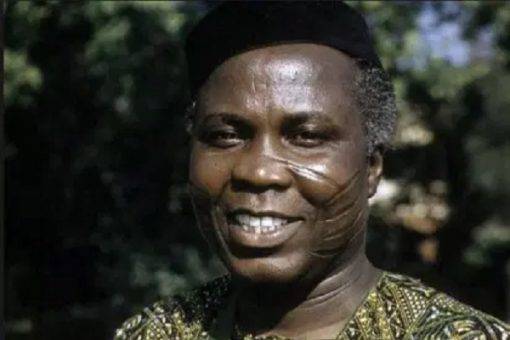By Lasisi Olagunju
At 89, old age has confined Dr. Omololu Olunloyo to the wheelchair, but he remains as sharp as he was 29 years ago when I first met him. He still does not wear eyeglasses, even to read. A genius who proved his prodigy as a toddler. I thought I should visit him and inform him how lucky he is that he was born in 1935 and not now. I sauntered into his genial presence last Friday; his back facing my arrival. He was born and raised at a time genius and youthfulness were not crimes and disabilities. Today’s children do not have his kind of luck – the girls can be married off at any age but can’t go to school at any age. From next year, both boys and girls in Nigeria are barred from seeking admission into the university at the age Olunloyo sought his.
On 16 July, 2013, our senators fought over what should be the age of maturity for the Nigerian girl. The Senate had sat to review Section 29 of the 1999 Constitution. Section 29(4)(b) says “any woman who is married shall be deemed to be of full age.” Popular Senator Ahmed Sani Yerima from Zamfara State, supported by Senator Danjuma Goje from Gombe State, stoutly opposed a recommendation that that Section 29(4)(b) be deleted so that 18 years contained in Section 29(4)(a) could be affirmed properly as the age of maturity in Nigeria. Senator Sani argued that once girls of any age are married, they are considered mature and “of full age.” The Senate upheld his argument after a storm. The provision was retained and it is there in our constitution as I write this.
Some actions and decisions are as hot as 20-year-old pounded yam – they burn fingers. Senator David Mark who presided over the voting exercise on that clause in 2013 warned his colleagues that they were “on the threshold of history.” He asked each of them to “vote according to (their) conscience.” And they did, endorsing marriage (not 18 years) as the marker of maturity for girls. Could it be that today’s education minister, Tahir Mamman, is unaware of that provision in our constitution which his senators championed and endorsed eleven short years ago? Minister Mamman told a national television last week that age 18 is the minimum for writing the Senior Secondary School Certificate exams and the Unified Tertiary Matriculation Examination. He said he was enforcing an old, existing policy.
If a girl of 14 years is considered “of full age” by our constitution because she is married, shouldn’t that her “full age” automatically qualify her for university education? And, shouldn’t this, in fact, apply to boys also because the same constitution – Section 42(1a & b) – expressly forbids discrimination on the basis of sex? If the married are qualified because they are married, the unmarried ones have Section 15 (2) of the constitution to run to. The section adds discrimination on the basis of “status” to the list of the prohibited. Marriage is a social status.
Senator Sani Yerima is out of the Senate but Goje is still there. So, can Goje please come out against this education policy as boldly as he and Yerima did in 2013 for marriage? If he needs to foment trouble for the Senate president as he did for David Mark in 2013, he should for the sake of the future. He should be heard loud and clear telling our minister and the president that anyone who is mature enough to read through Senior Secondary School up to the point of writing the final papers should also be deemed “of full age” and “of university age”. Whatever (and whoever) is good for marriage should be good for education – except there is something else hidden in this 18-years policy enforcement. Or is it a distraction from the existential pains of the present?
Someone should tell the minister and his boss, the president, that they cannot climb this tree from the top. The policy they are vowing to implement is 6-3-3-4. If they want to enforce the 18-years-or-nothing policy, the place to start is the point of entry into primary school – the first year of the first six years of schooling. That is, if they can do it without first expunging Section 29(4)(b) from the constitution.
It is President Bola Tinubu I pity more here. What his minister is toying with is a decision that will affect every home where education is prized above politics. You can’t ask sixteen-year-old children of the rich and the poor not to write their final exams and be greeted with love and thanks. No. What would those students be doing between their present age and when they would clock 18? Marriage or street trading or banditry? I should think Tinubu is too smart to own this gamble and be buried in its rubble. He will certainly find out that this matter is far more dangerous than mass hunger and oil subsidy removal. This journey is an ambiguous adventure which will likely drag his government into a forest of a billion troubles.
“A righteous man regards the life of his beast: but the tender mercies of the wicked are cruel.” The system appears not done with helpless parents who are condemned to life perpetually spent on petrol and palliative queues. It has moved its afflictive fingers to their children. But why?
A horde of regime choristers are online and offline singing endorsements for this hemlock. Tinubu should run away from them and check them out. Those ones and or their own children graduated long ago at ages younger than what they prescribe now. They now say today’s young ones are too much in a hurry. The median age at death is what the white man calls life expectancy. The WHO says it refers to “the number of years a person can expect to live.” In the United States, it is 79.25 years. In Nigeria, as I write, it is 56.05 years. Out of those 56 short years, ASUU will take its own which is infinite; NYSC will take one. Very crucial is unemployment which will take years that are indeterminate in number. How many do we really have to live? And you want these super kids to waste away waiting for your magic year before trying their luck by going to the university?
I met Olunloyo last Friday sitting exactly the way an Einstein would in a lab. First Class (Honours) Mathematics; PhD Applied Mathematics at age 26; commissioner at 27; former governor, Oyo State. He was there, profoundly deep, all sorts of printed materials around him. I saw him immersed in the soul of what was playing from a sound box by his side stool.
“Classical,” I said of the tune wafting in the air.
“Yes. Heavenly. W.A. Mozart, 1756 to 1791. Genius,” he told me.
Wolfgang Amadeus Mozart, composer and pianist. Mozart started playing music at age 3; he started composing at age 5. By the time he was 17, he had played in European royal courts and palaces. A biographer described his physique as “remarkably small”; another agreed that “he was small” and added that “his large intense eyes gave no signs of his genius.” Mozart had a total of 626 compositions: symphonic, operatic, chamber, choral. He did all he had to do and died at thirty five. His number 626 composition is named ‘Requiem.’
“He was a prodigy. He had no time to go to school,” Olunloyo told me. I replied that if Mozart was born here and now and would want to go to school, our government would say no. He cannot; he must wait for his age and time. Even if he smuggled himself into a school, the system would wait for him at the port of disembarkation. He would not write his final papers until the year our government decreed him ripe. We laughed. Olunloyo described the government policy of outlawing writing WAEC and NECO exams before age 18 as nonsense. “I wrote mine at 17,” he stressed.
If you meet your gist mate, you become talkative. We launched into a long session, discussing the age and life of geniuses, plunging deep into music and mathematics, particularly the marriage between the two disciplines. He brought out his secondary school class four result sheet. I looked at it and smiled. He asked why. I told him his Biology looked like mine. I never scored more than 68 in that subject. He was a one hundred percenter in mathematics. I told him I had that too, not once, not twice. Maths was my forte before I was abducted by literature and the arts. Really? Yes, but that was where the comparison ends. I was not described as “very heady” by any of my own teachers. At the university, Olunloyo consistently beat his own records where he took “first place in all his mathematics classes.” He was described as a gold medallist at the 611-year-old University of St Andrews, Scotland, where he did his PhD. What does being a gold medallist mean? I asked him. He said it meant being first among the first.
“For instance, in an exam, I scored 132 over 100.” He told me and I couldn’t understand how that arithmetic was possible. I asked him how.
“If you are asked to answer five questions for full marks and you go on competitively to do as many as you wished, you get more than 100,” he explained. I asked if that happened to him once. “More than once,” he answered and I laughed. He asked why. I told him, here, he would fail; you can’t be asked to answer five questions and you proceed to answer all eight questions contained on your question paper. The system will fail and ‘jail’ you for not following instructions. You will be guilty of a crime called ‘too know.’
We went back to Mozart.
“His music makes the smart smarter”, I teased the old genius. He looked at me, flashed the old blithe smile and pointed at my phone.
“Yes, the Mozart Effect. Let’s ask Google for details on that.” I checked. The Mozart Effect is a scientific theory that links music with smartness. It is popular and proven. It claims, with more than an assumption, that listening to Mozart’s compositions and other classical music increases spatial intelligence. “Yes,” Olunloyo chipped in his experience: “When I was in school, his number 525 was always the last music we played before entering the exam hall.”
“Oh. It was your talisman, Mozart’s music?”
“It worked,” he said, smiling.
My people say a song that is not difficult to lead should not be difficult to follow. They say when a good leader says “haaay”, he wouldn’t long to hear behind him “haaah”. Given the right place and age, brilliance can be contagious. Mozart produced another music genius in a man called Ludwig Beethoven. At age seven, this child prodigy had his first public performance. He also never had formal schooling but is remembered today as “one of the most revered figures in the history of Western music.” He was lucky that he was born where he was born and when he was born. His youthful age would be of no value here – except for marriage and associated conjugal bedroom benefits.
We moved to Évariste Galois (1811-1832). Remarkable mathematics genius. People of Mathematics, and generally of STEM, remember him with thanks for giving their world Abstract Algebra and Group theory from which computer science, physics, coding theory and cryptography evolved and got their buga. What is astounding is that Galois did almost all his mathematical ‘magics’ as a teenager. History records him as that tiny boy who solved a mathematics problem that had been open for 350 years. He died at 21. If he was here, his genius would have long died before him.
There was also Carl Friedrich Gauss, one of the founders of Geophysics. Our government people who are making fetishes of age 18 should read the history of this genius who is called the ‘Prince of Mathematics’. History says at age three, Gauss corrected a maths error made by his father. There are other stories about this genius which may teach our husbands some lessons in how to implement policies without killing the star in our kids.
At age 10, Gauss found a shortcut for calculating the sum of an arithmetic progression. The story goes that one afternoon, Gauss’s schoolteacher was tired of teaching. He thought the way to find some rest was to keep his troublesome class busy. He gave his little pupils what he thought was a maths exercise that would sweat them for at least 10 or 15 minutes. Teacher asked students to sum the integers from 1 to 100. In simple English, the teacher asked his students to do 1+2+3+4+5+…up to 99+100. In less than five seconds, Gauss told teacher he had found the answer. What is the answer? Gauss replied that the sum was 5050. History says the boy’s classmates and teacher were astonished. All others fumbled and failed to get the correct answer within the allotted time. How did Gauss do it? Dr Olunloyo said precocious Gauss simply calculated 100x(100+1) and divided it by 2. He said he had his (Olunloyo’s) own way of doing the same sum – also in record seconds. My host picked a piece of paper, collected my pen, and proceeded to demonstrate the method to me, his student. I thought his is simpler and faster than Gauss’. Carl Friedrich Gauss went on in life to confound the world with his genius. He had his PhD at age 21 – a feat that would be classified irregular and unacceptable by the education policy of today’s government in Nigeria.
There was also Blaise Pascal (1623-1662). He too made his mark in maths, physical science and philosophy. He had a father that behaved almost like our minister of education who is saying that you can’t proceed in learning unless you are 18. Pascal plunged himself into studying geometry at a very young age. At age 12, he found what we still use today in our study of angles and triangles. Pascal theorized that “the inside angles of a triangle always add up to the total of two right angles.” His father, also a mathematician, was alarmed at his son’s precocity. He thought the boy was too young for what he got himself into. The way to save the boy from himself was to remove all mathematics textbooks from the house. But because the boy was on his way to meet his destiny, he found a way around his dad’s sanctions: He started doing geometry whenever his father was out or he was too busy to look his boy’s side. The father soon surrendered to his son’s genius and encouraged his flower to bloom. And it did, spectacularly. He invented the world’s first calculator in 1642 among other great things he did. Then he branched into philosophy where he used maths to prove the existence of God. He donated to the world what is known today as ‘Pascal’s Wager’: Believe in God “is a wise wager…If you gain, you gain all; if you lose, you lose nothing. Wager then without hesitation that He is.”
Tortoise wishes to fight with his fists, but he has no fingers. The helpless people of Nigeria are that Tortoise. This fact the sword holders know. What is so special about the corpse of this 40-year-old policy that it must be exhumed from the cemetery to pollute the progress of our kids? And, why now, why ever?
I had a university classmate who graduated First Class at age 19. That was 34 years ago. She is doing very well today in the United States. Immediate past governor of Kaduna State, Nasir Ahmad El-Rufai, was born on 16 February, 1960. For his secondary school education, he attended Barewa College, Zaria and graduated there at the top of his class in 1976. How old was he when he achieved that feat? He was certainly not 18. Around me at home and in the office are exceptionally brilliant young men and women who left the university by or before age 20. Today’s homes are dormitories of geniuses. As Chief Afe Babalola argued in a newspaper report last Friday, “children are now demonstrating exceptional academic intelligence which is not common in their ages.” This government cannot be allowed to stop their momentum. The uproar against this government’s war on genius is loud in the air. It will remain loud. If the pesky lice of this regime stay stubborn in the hems and seams of our babanriga, our thumbs will not stop crushing them; bloodstains on the fingernails won’t be our bother.













